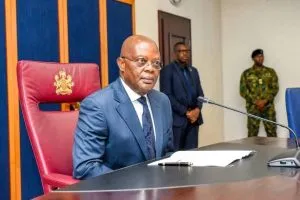Day 2: NLC, TUC Strike not political, Osifo slams Adams Oshiomhole

The recent strike by the Nigerian Labour Congress (NLC) and Trade Union Congress (TUC) has been a hot topic of discussion. While some believe that the strike is politically motivated, others disagree. One of those who disagree is the President of Trade Union Congress (TUC) Mr Festus Osifo, who slammed Adams Oshiomhole for suggesting that the strike was politically motivated.
According to Mr Osifo, the strike is not about politics but about the welfare of Nigerian workers. He argued that the strike was necessary because the government had failed to address the issues raised by the workers. Osifo went on to say that the strike was a wake-up call for the government to take the welfare of Nigerian workers seriously.
On Tuesday, Oshiomhole visited the Aso Villa in Abuja and inferred that labour’s moves in Imo was political.
However, Osifo said that was not true, adding that the former NLC leader gave his opinion based on the information he was provided at the Villa.
Many Nigerians have expressed support for the strike, with some saying that it is long overdue. Others, however, have criticized the strike, saying that it is causing unnecessary hardship for ordinary Nigerians. Regardless of one’s opinion on the strike, it is clear that it has sparked an important conversation about the welfare of Nigerian workers and the role of the government in ensuring that they are treated fairly.
The strike has also revealed the stark reality of the current economic situation in Nigeria. Many workers are struggling to make ends meet, with some earning as little as ₦30,000 ($30) per month. The cost of living in Nigeria has continued to rise, with inflation at a four-year high of 18.17%. This has made it even more difficult for workers to provide for themselves and their families.
The strike has also highlighted the need for the government to diversify the economy and create more job opportunities. Nigeria has long relied on its oil industry, but the recent decline in oil prices has had a significant impact on the economy. The government must now invest in other sectors such as agriculture, manufacturing, and technology to create more jobs and reduce the country’s dependence on oil.
In conclusion, as the NLC & TUC strikes enters Day 2, Nigerian Labour Congress and Trade Union Congress has brought to the forefront the pressing issues facing Nigerian workers. It is now up to the government to take action and address these issues to ensure that Nigerian workers are treated fairly and have access to better living conditions.






